Prostatitis is an inflammation of the prostate gland that affects men 20 and older.
According to statistics, 1 in 4 men has this disease in one way or another. In recent years, there has been a persistent trend to "rejuvenate" the process. This is due to sexual freedom, the increase in sexually transmitted infections, the tendency to self-diagnose and treat on the Internet, and the resistance of infectious agents to antibiotic therapy.
This is especially true because in men, the first signs of prostatitis are usually removed, which does not allow you to see a doctor in time, and in some cases leads to the development of advanced prostatitis.
Symptoms of prostatitis in men
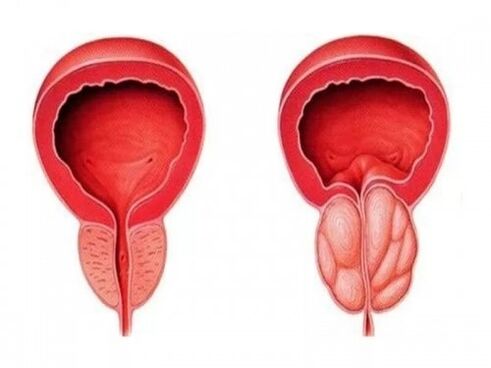
The characteristics of the structure, blood supply and location of the prostate gland affect the nature of the symptoms that will cause its inflammation. These include:
- Pain symptom.
- Symptoms of urinary incontinence (dysuric).
- Symptoms of erectile dysfunction.
Pain symptom
Pain of varying severity worries the man in the lower abdomen, perineum, genitals, lumbosacral waist. This part of the pain is caused by the presence of nerve connections and the involvement of the seminal vesicles (vesicles) in the inflammatory process.
Pain can range in intensity from an inexplicable feeling of discomfort to intense pain that affects a man's mental state and causes insomnia. Painful feelings depend on sexual behavior and occur with or without regular ejaculation. is associated with the spread of the inflammatory process in the posterior urethra.
Pain in the lumbosacral region may not be related to the prostate gland in any way, but may be the result of, for example, osteochondrosis of the spine. The results of the conversation with the patient and the data of the urological examination determine the cause of such pain.
The first sign of prostatitis in men is pain in the testicles (scrotum area) along the epididymis (right and left groin area), pain from the inflamed prostate can be seen in the inner thighs, back. This dictates the need to consult a neurologist to rule out neurological pathology, as such a spread is not typical for prostate pain.
In some cases, the radiation of painful sensations is asymmetric, which allows to suspect an inflammatory process localized in part of the prostate gland. Where it recurs, the pain syndrome divides into the genitals (genital area). , characteristic of congestive chronic prostatitis), extragenital (above the genitals), characteristic of advanced prostatitis) and mixed (chronic prostatitis).
Symptoms of urinary incontinence with dysuria or prostatitis
Urinary disorders are characterized by a feeling of incomplete emptying of the bladder with false urges, frequent urination associated with inflammation of the neck of the bladder and urethra. Symptoms of prolonged dysuria in prostatitis indicate the chronicity of the process.
Erectile diseases with prostatitis

Erectile dysfunction in prostatitis is characterized by premature ejaculation, blurred sensations during orgasm, decreased libido, weakened erection. Sometimes a man's prostatitis can be suspected in the absence of an erection in the morning.
The first sign of prostatitis in a man is a decrease in strength, a decrease in the synthesis of testosterone (the male sex hormone).
Manifestations of inflammation in the prostate gland are not limited to the above three symptoms. The first sign of prostatitis in a person is a discharge of prostate secretion from the urethra during defecation (prostatorea), which indicates a decrease in muscle tone of the ejaculatory ducts.
In addition, the psychological symptoms of prostatitis in a person should not be ignored: astheno-neurotic syndrome develops from the nervous system (depression, fatigue, unwillingness to do any work, physical weakness).
The first signs of acute prostatitis
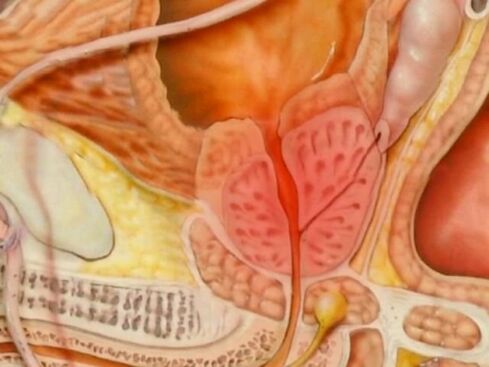
All of the above symptoms are typical for chronic inflammation of the prostate, the picture is slightly different in men with acute prostatitis.
The disease begins with severe pain in the perineum, the symptoms of urinary incontinence are more pronounced. There is a rise in temperature to 38-39 C, chills, weakness, sweating, pain in muscles and bones. Pain in the anus during defecation is a concern. There is no sex life.
If you do not pass the examination on time and do not start treatment, the acute process will be complicated by purulent prostatitis to the abscess, which will lead to emergency surgery.
If there are no other causes (immunodeficiency conditions, severe accompanying pathology, etc. ) - purulent prostatitis in men - an inflammatory process that develops due to failure to consult a doctor in time!
Symptoms of prostatitis
Factors affecting inflammation in the prostate were conventionally divided into 3 groups.
Non-responsive factors include:
- Body structure.
- Sexual constitution.
- Age factor.
- Presence of diseases.
- Environment (climate factor).
Partially managed factors:
- Sexual habits.
- Profession.
- Background diseases of the male genital area.
- Attitude to the disease.
And finally, the managed factors:
- Uncomplicated sex life.
- Alcoholism.
- Non-compliance with treatment recommendations.
- Errors in power supply mode.
Who is at risk
Prostatitis threatens men:
- Follow a sedentary lifestyle.
- Suffer from chronic constipation.
- Presence of venereal infections.
- Have more than one sexual partner.
- Suffer from alcoholism and drug addiction.
- They work in cold conditions.
What to do if you have symptoms of prostatitis
Laboratory diagnosis of prostatitis
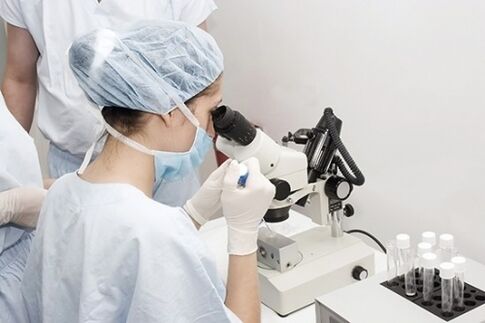
- In KLA, an increase in the rate of erythrocyte sedimentation, a shift to the left in the leukocyte formula. In OAM - leukosituria, proteinuria, bacteriuria.
- Blood for HIV infection.
- A spot in the urethra in the flora, as a rule, is completely leukocytes. When a venereal pathogen (Neisser gonococcus, Trichomonas) is not identified, PCR diagnosis is important.
- Prostate secretion. Implantation of postoperative gland secretion on the pathogen and determination of antibiotic susceptibility.
- PCR - diagnosis of sexually transmitted infections. The most reliable and fastest way to check for pathogens.
- Blood for PSA Blood for PSA (prostate-specific antigen) should not be taken during an acute inflammatory process in the prostate gland, the result will be invalid. It is better to do this analysis 1 month after the end of therapy. Young people under the age of 30 do not need to check their blood PSA levels. This test is important for a man over the age of 40 because in some cases, acute prostatitis can be secondary and mask a malignant tumor in the prostate gland. behind the clinical manifestations.
Instrumental diagnostic methods
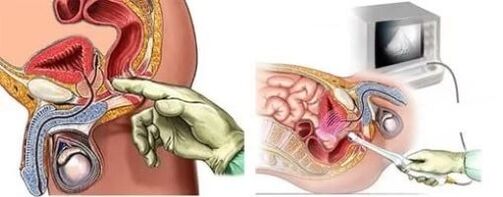
As a rule, transrectal (through the rectum) or transabdominal (intra-abdominal) ultrasound examination of the prostate is sufficient.
Symptoms of prostatitis on ultrasound
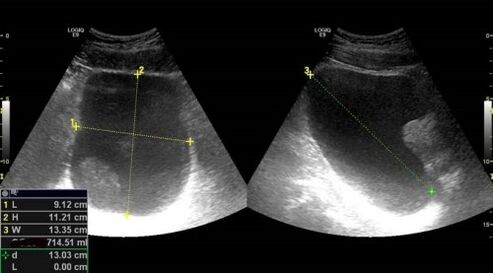
Glandular volume increase, tissue changes, edema; With purulent prostatitis - areas of necrosis, contour deformation, growth of regional lymph nodes.
What to look for
First of all, you need to follow a certain diet to get rid of the symptoms of prostatitis forever.
Exacerbation of prostatitis in men depends on food irritants: hot spices, vinegar, acid, alcohol.
Special mention should be made of alcohol, even minimal use can reverse the effects of long-term complex therapy.
Some patients think they need to drink less or switch to more alcoholic beverages. This is their main mistake.
Diluted vinegar, kvass, citrus fruits, sauerkraut, tomatoes and cucumbers have no harmful effects on prostatitis.
Eating fiber-rich foods will relieve constipation - one of the main causes of constipation in the small pelvis.
Herbal medicines are good for prevention. Taking herbal diuretics: lingonberry leaves, fennel seeds, urological collection helps to improve urinary excretion during inflammation.
Exercise, especially to improve blood circulation in the pelvic organs, helps keep the prostate in good condition.
The development of inflammation in the prostate causes hypothermia. It is worth wearing warmer in winter and you should not be in wet swim trunks for a long time after swimming in summer.
Using a condom when having sex with a partner you don't know will protect you from sexually transmitted diseases, including HIV.
Prolonged fatigue has a negative effect on a man's immune system, as well as stressful situations that can exacerbate a dormant infection in the prostate gland. Regular preventive examinations by a urologist will help protect men's health.



























